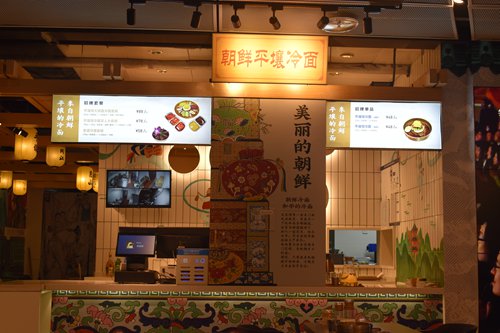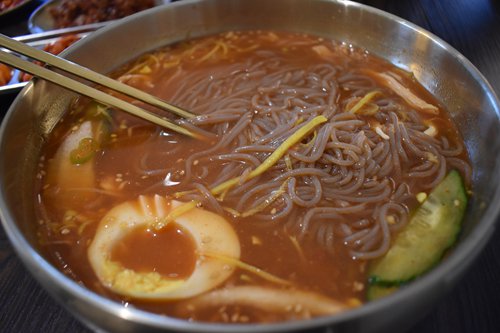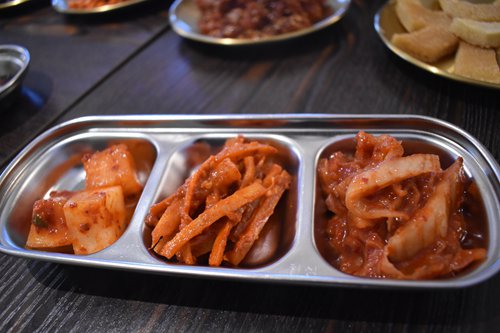Authentic flavor
By Chen Xi Source:Global Times Published: 2019/9/17 16:43:40
North Korea’s Okryu-gwan restaurant gives Beijingers a chance to taste tradition

The Okryu-gwan restaurant in Beijing Photo: Chen Xi/GT

A bowl of naengmyeon cold noodles Photo: Chen Xi/GT

Korean side dishes Photo: Chen Xi/GT
When I arrived at the fifth floor of the Ms Jungle shopping center in Xidan, one of Beijing's major commercial areas, a giant screen showing major events in China-North Korea relations such as Chinese chairman Mao Zedong meeting North Korean leader Kim Il-sung and Chinese President Xi Jinping meeting with North Korea's current leader Kim Jong-un caught my attention.
"That must be Okryu-gwan, the well-known restaurant in Pyongyang, North Korea," I thought, looking at the restaurant by the screen. A closer look confirmed my suspicion as I saw a sign that read "Enjoy authentic naengmyeon noodles from Pyongyang, North Korea!"
Four waitresses stood by the door greeting customers. Their Chinese was so good that I thought they were locals at first, but it turned out they were all from North Korea. Each server had a name tag on their orange uniform that displayed their name in both Korean and Chinese.
Simple and traditional
A waitress whose Chinese name was Li Shan came to my table and gave me a menu. The menu was very simple, the main dishes being variants of naengmyeon, one of the most traditional cold noodle dishes in North Korea. Naengmyeon comes in two flavors - hot and sour, and salty. The menu also had some traditional snacks in North Korea including a sundae made from steamed cow or pig intestines stuffed with sticky rice and tteok, rice cakes made from glutinous rice and mixed with bull paddywack, white sesame seeds and carrots.
My curiosity led me to order the naengmyeon set meal, which included two small bowls of the traditional noodles - one of each flavor - as well as three kinds of side dishes.
My food came very quickly. Each small bowl of naengmyeon looked like a meal unto itself as each contained soba noodles, half a boiled egg, Chinese cabbage, apple chips, cucumbers, chicken and beef. Li showed me the traditional way to enjoy the dish. She first mashed up the egg yolk and added some chili sauce, then used chopsticks to mix them into the soup. She then put some white vinegar on the soba noodles. She assured me that the chili sauce was not very spicy and that the white vinegar would make the noodles taste even sourer.
"Hot and sour naengmyeon has a stronger flavor than salty, so Chinese customers prefer the former because I think they prefer stronger-flavored food than we do," Li noted, adding that people in North Korea do not actually add much salt to the salty version as they prefer a more mild taste.
I asked her if the restaurant's noodles were made in North Korea, and she told me that actually all the ingredients were shipped from North Korea and that the North Korean chef then prepared the dishes in the restaurant.
"Although this restaurant has only been open for two months, we see many customers every day, especially weekends. However, now that the weather in Beijing is growing colder as fall approaches, not as many customers are ordering cold noodles so we are planning to change our menu. We might add some hot soup like doenjang-jjigae (soybean paste stew)," she said.
Li said Okryu-gwan has many branches in China, but the one in Xidan is special as it is a fast food resturant. A traditional Okryu-gwan restaurant tends to be much fancier and has a larger variety of high-priced dishes. According to Li, naengmyeon can be made in just 10 minutes, which is very convenient for the hungry customer in a hurry.
Living in China
Li told me she has been in China for two years, and that she transferred two months ago from another Okryu-gwan restaurant in Tongliao, North China's Inner Mongolia Autonomous Region.
She said she studied at a catering college in North Korea and applied to work in China after graduation.
"We needed to take some strict exams before getting the job. For example, we have to know how to serve customers in a restaurant. But we did not learn Chinese. I actually did not know Chinese when I came here. I've learned it from my customers over the last two years," Li said, smiling.
I was very impressed by her ability to learn Chinese in such a short time as it was clear she was already very fluent.
Li said she enjoys working in China because she is able to earn much more than if she worked in the same restaurant at home.
"China is very big, and my Chinese customers are very friendly. But I only have three years left in China since my contract is for five years," Li said, noting that she can apply for another five years after her contract expires.
"I would like to keep working in China for a longer time," she said.
Posted in: MISCELLANY,TOUCH OF WARMTH,ARTS FOCUS